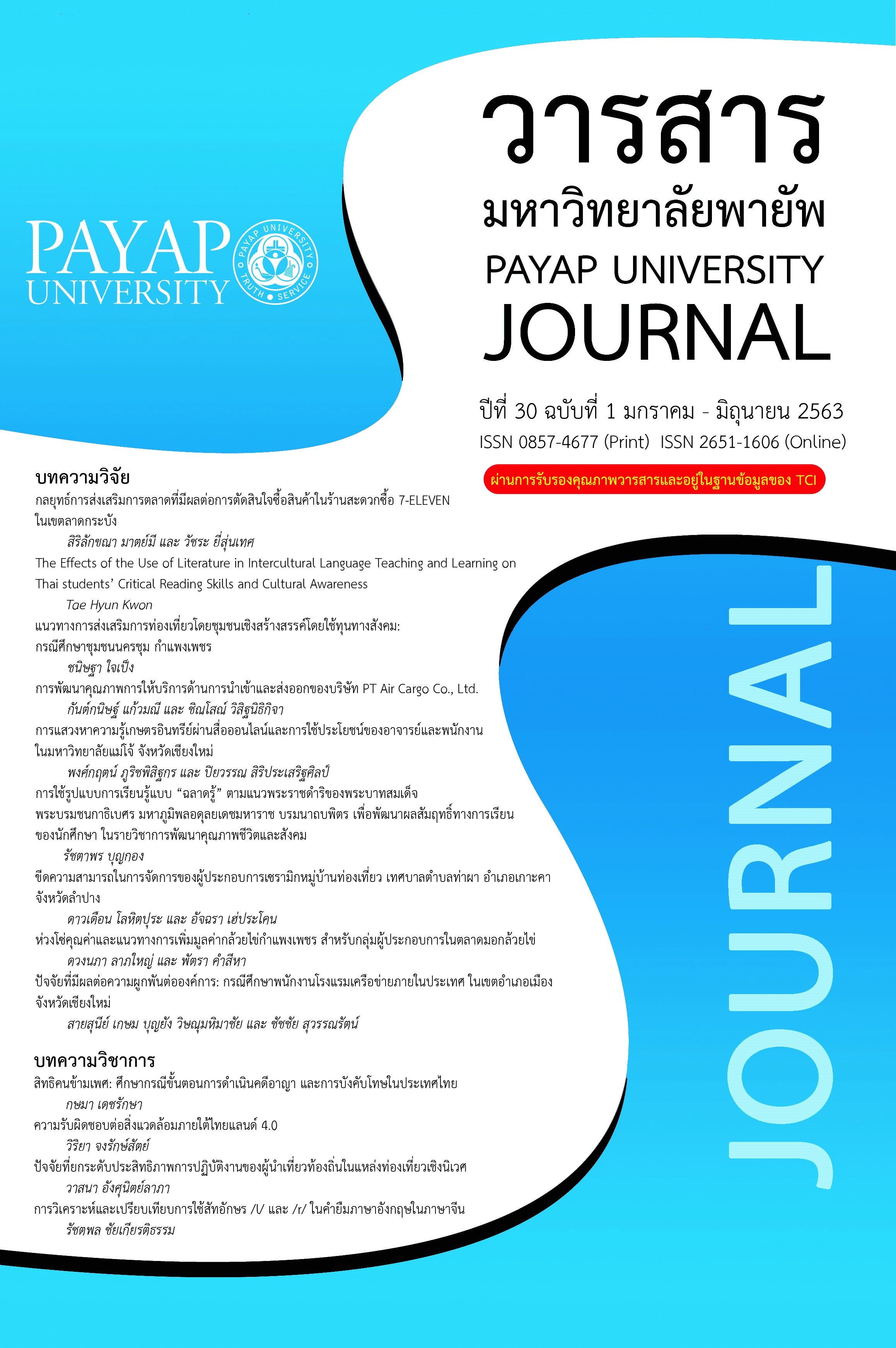ปัจจัยที่มีผลต่อความผูกพันต่อองค์การ: กรณีศึกษาพนักงานโรงแรม เครือข่ายภายในประเทศ ในเขตอำเภอเมือง จังหวัดเชียงใหม่
Main Article Content
บทคัดย่อ
งานวิจัยนี้ ศึกษาระดับความผูกพันต่อองค์การ และปัจจัยที่มีผลต่อความผูกพันต่อองค์การของพนักงานโรงแรม โดยใช้แบบสอบถามเก็บข้อมูลจากกลุ่มตัวอย่าง คือพนักงานโรงแรมเครือข่ายภายในประเทศ ในเขตอำเภอเมือง จังหวัดเชียงใหม่จำนวน 3 แห่ง โดยใช้การสุ่มตัวอย่างแบบโควต้า และแบบตามสะดวก สถิติที่ใช้ทดสอบสมมติฐานคือ t-test ANOVA การเปรียบเทียบรายคู่ (Post Hoc) และ ค่าสหสัมพันธ์เพียร์สัน ผลการศึกษาพบว่า กลุ่มตัวอย่างมีความผูกพันต่อองค์การในระดับมาก โดยปัจจัยที่ส่งผลต่อความผูกพันต่อองค์การ ด้านลักษณะองค์การ และลักษณะงาน มีระดับเห็นด้วยมากที่สุด และด้านประสบการณ์ในงาน มีระดับเห็นด้วยมาก ระดับความผูกพันต่อองค์การโดยรวม อยู่ในระดับมาก พิจารณารายด้านพบว่า ด้านความเชื่อมั่นอย่างแรงกล้าและการยอมรับเป้าหมายและค่านิยมขององค์การ และด้านความเต็มใจที่จะทุ่มเทพยายามอย่างมากเพื่อประโยชน์ขององค์การ อยู่ในระดับมากที่สุด และด้านความปรารถนาอย่างแรงกล้าที่จะคงไว้ซึ่งความเป็นสมาชิกภาพขององค์การ อยู่ในระดับมาก การพิสูจน์สมมติฐานที่ 1 พบว่า อายุ ระดับการศึกษา และตำแหน่งงานที่ต่างกัน มีผลให้ความผูกพันต่อองค์การแตกต่างกัน การพิสูจน์สมมติฐานที่ 2, 3 และ 4 พบว่า ปัจจัยทั้ง 3 ด้านที่ศึกษาสัมพันธ์กับความผูกพันต่อองค์การในระดับสูง
Article Details
เอกสารอ้างอิง
กังวาน ยอดวิศิษฎ์ศักดิ์. (2557). การสร้างความผูกพันของพนักงาน โดยแนวคิดองค์การแห่งความสุขในกลุ่มคน Gen-Y. WMS Journal of Management, 3(2), 1-10.
กิ่งแก้ว ทรัพย์พระวงศ์, ณภัทร วุฒิวงศา, ภรภัทร ชูแข, และปิยวุฒิ ศิริมงคล. (2558). อิทธิพลของความพึงพอใจในการทำงานและการเห็นคุณค่าในตนเองที่มีต่อความผูกพันต่อองค์การเมื่อควบคุมและไม่ควบคุมปัจจัยส่วนบุคคลของพนักงานโรงแรม. วารสารปัญญาภิวัฒน์, 7(1), 99-115.
กิตตินันท์ นาคทอง. (2560). บัดเจ็ทโฮเทล แข่งขันดุ ที่พักหลักร้อยของนักท่องเที่ยว, สืบค้นเมื่อ 11 มกราคม 2561. https://mgronline.com/columnist/detail/9600000082455.
ชูชัย สมิทธิไกร. (2554). จิตวิทยาอุตสาหกรรมและองค์การ. กรุงเทพฯ: สำนักพิมพ์แห่งจุฬาลงกรณ์มหาวิทยาลัย.
ณัฏฐพันธ์ เขจรนันทน์. (2551). พฤติกรรมองค์การ. กรุงเทพฯ: ซีเอ็ดยูเคชั่น.
ธานินทร์ ศิลป์จารุ. (2550). การวิจัยและวิเคราะห์ข้อมูลทางสถิติด้วย SPSS. กรุงเทพฯ: วีอินเตอร์ พริ้นทร์.
พิชิต เทพวรรณ์. (2554). การจัดการทรัพยากรมนุษย์เชิงกลยุทธ์. กรุงเทพฯ: ซีเอ็ดยูเคชั่น.
ภูวดล บุญอ่ำ. (2558). ปัจจัยที่มีผลต่อความผูกพันในองค์การของพนักงานธุรกิจโรงแรมในกรุงเทพมหานคร. วารสารเทคโนโลยีภาคใต้, 8(1), 9-16.
วรรณวิภา นิลวรรณ. (2554). ความผูกพันต่อองค์การของข้าราชการครูและบุคลากรทางการศึกษาในวิทยาลัยอาชีวศึกษาสุราษฎร์ธานี จังหวัดสุราษฏร์ธานี. การค้นคว้าอิสระปริญญามหาบัณฑิต วิชาเอกการจัดการทั่วไป คณะบริหารธุรกิจ มหาวิทยาลัยเทคโนโลยีราชมงคลธัญบุรี.
ศราวุธ โภชนะสมบัติ. (2559). ปัจจัยที่มีอิทธิพลต่อความผูกพันในองค์กรของบุคลากร สำนักงานป้องกันควบคุมโรคที่ 8 จังหวัดนครสวรรค์. นนทบุรี: กรมควบคุมโรค กระทรวงสาธารณสุข.
สุภาภรณ์ ประสงค์ทัน. (2555). ความผูกพันของพนักงานต่อองค์การ: การเพิ่มขีดความสามารถทางการแข่งขันของธุรกิจโรงแรมไทยในยุค AEC, สืบค้นเมื่อ 11 กันยายน 2561. cs.human.ku.ac.th/ art_attachments/art55.pdf.
Arustei, C. (2013). Employees’ organizational commitment challenges-A hotel industry perspective. Management Dynamics in the Knowledge Economy, 1(3), 497-520.
Choi, K. (2006). A structural relationship analysis of hotel employees' turnover intention. Asia Pacific Journal of Tourism Research, 11(4), 321-337.
Hinkle, D.E, William, W., & Stephen G.J. (1998). Applied Statistics for the Behavior Sciences (4th ed). New York: Houghton Mifflin.
Kalidass, A., & Bahron, A. (2015). The relationship between perceived supervisor support, perceived organizational support, organizational commitment and employee turnover intention. International Journal of Business Administration, 6(5), 82-89.
Lam, T., Lo, A., & Chan, J. (2002). New employees' turnover intentions and organizational commitment in the Hong Kong hotel industry. Journal of Hospitality & Tourism Research, 26(3), 217-234.
Mowday, R.T., Porter, L.W., & Steers, R. (1982). Organizational linkages: The psychology of commitment, absenteeism, and turnover. San Diego, CA: Academic Press.
Ozturk, A.B., Hancer, M., & Im, J.Y. (2014). Job characteristics, job satisfaction, and organizational commitment for hotel workers in Turkey. Journal of Hospitality Marketing & Management, 23(3), 294-313.
Yildirim, M., Acar, A., Bayraktar, U., & Akova, O. (2015). The effect of organizational commitment and job commitment to intention to leave of employment: a research in hotel management. International Journal of Business and Social Science, 6(11), 128-137.


